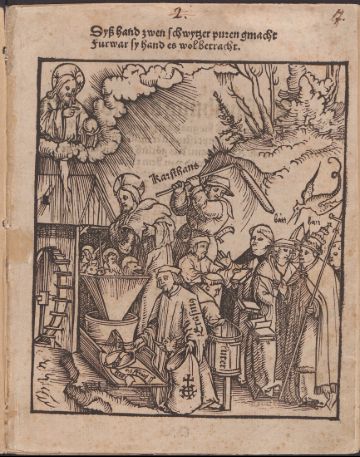Die Anfänge - The Beginnings
Anabaptism emerged as part of the Europe-wide awakening of the early Reformation in the 1520s. In the process, very different impulses worked together: Religious, social, and economic. Early Reformation propaganda such as the "Göttliche Mühle" (Divine Mill) of 1521 illustrates this:

Picture credits: Martin Seger, Dyss hand zwen schwytzer Puren gmacht, fürwar sy hand es wol betracht. Getruckt zuo Zürich : [Christoph Froschauer the Elder], [1521] (Zentralbibliothek Zürich, Zwingli 106: a.1).
Many people suffer from grievances in church and society in the 1500s. The call for reform becomes louder and louder. Scholars such as the humanist Erasmus of Rotterdam in Basel, the monk Martin Luther in Germany and the priest Ulrich Zwingli in Zurich discover the liberating potential of the biblical word.
In the picture, the three in the "Divine Mill" process the Gospel given by Christ into flour, knead it into dough in the trough and bake it into rolls, which they present to the rulers in the form of Bibles. But they reject the offer and the books fall to the ground. Does this mean that the hope for reform has been lost?
The "Karsthans" with the flail stands for the simple countryman, who suffers most from the burden of taxes and the service of monasteries and princes. However, he does not seem to want to thresh grain, but rather takes a threatening swing in the direction of the powerful church representatives.
In some regions of Europe, the Reformation prevailed by 1530. However, not all hopes for liberation and a new beginning were fulfilled. Some wanted to go further than Luther and Zwingli in the renewal of church and society. They rebelled.
Many "Karsthanse" therefore took up arms in 1525. The Peasants' War broke out. And now not only "old believers" fought back, but also "great reformers" like Martin Luther who were loyal to the system.



